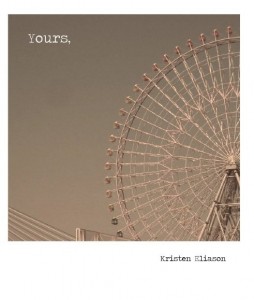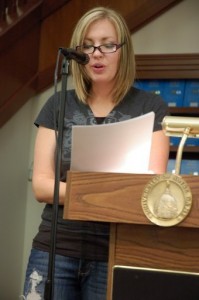For the next installment of our Alumni Interview Series, we had the privilege of catching up with Kristen Eliason (2008) and chatted with her about her new book of poetry, her time in Japan, karaoke (of course), and reading recommendations.

1) Can you tell us about the moment you realized you wanted to be a poet?
I started writing poetry when I was a junior in high school. Most of it was really awful unrequited love yack, but one poem caught my teacher’s attention and she really encouraged me. I don’t remember wanting to become a poet as much as I remember feeling that writing was as essential and inescapable as exhaling.
2) Your book, Picture Dictionary, is forthcoming from Flaming Giblet Press. Can you go into how this collection originated, how it found Flaming Giblet, and, of course, when we can expect to get our eyes on it?
Several years ago, I found that I had agreed to teach English to Japanese students on the smaller island of Shikoku. I spent eight months living in Kanonji, Kagawa-ken, with no one that I knew and only a handful people with whom I could communicate on a meaningful level. I found that a picture dictionary – a dictionary that included a word in English, its meaning in Japanese, and a picture of the word – became a shorthand for the things I couldn’t say in any language. The grief I had undergone in the passing of a man I loved pressurized the language I had left, and I wrote an elegy in structured, short stanza poems.
I found Flaming Giblet through a friend who recommended it to me as a good fit for the genrelessness of Picture Dictionary, and I am thrilled that they have added it to their 2014 lineup. It should be available in the beginning of the year.I developed Picture Dictionary as a companion piece to the short, crystalline poetry I had written—a study in issues of translation, cultural aphasia, the degradation of memory in the wake of grief, and the fragmentation of language under pressure.
3) You also have a chapbook out from Dancing Girl Press called Yours. Can you tell us a bit about what you were trying to communicate with those poems?
As I mentioned earlier, I was a little isolated during my time in Japan, by virtue of the fact that I didn’t speak much Japanese, and I didn’t know more than a handful of people who spoke English. And frankly, the person I wanted to talk to wasn’t available. These poems are missives to a beloved, and a further attempt to make heads or tails of everything that had happened in the previous months.

4) Do you have any tips for someone traveling to Japan? Anything to be on the lookout for? Must-see sights? Is it true there are establishments where people can have a private, personal room for singing karaoke to themselves?
Okay, wow, this is a huge question; the advice I would give to anyone travelling anywhere would be to really get as lost as possible. Make a plan and wander away from it as soon as you can. Go during cherry blossom season. And try everything. Including karaoke in a private singing room.
5) Follow-up to the previous question: Do you do karaoke? If so, what are your go-to songs? (I’m partial to Matchbox 20 myself.)
Power Ballads or nothing. Bonnie Tyler’s epic Total Eclipse of the Heart and/or Heart’s masterpiece, Alone.
6) Follow-up to the follow-up: Do you mean to say that you tried the private singing room experience? If so, how would you describe it to an innocent but interested interviewer?
I definitely tried the private karaoke rooms in Japan! Something about going into a lobby and then having someone take you down a dark hallway to a sound-proof room felt seedy and dark and exciting and it was just singing. Our group of friends piled into a room with a booth to sit in, a screen for the lyrics and a sound system and jumped on the Celine Dion catalog. They had a good number of older pop songs in English as well as Japanese, so there was something for everyone.

7) Switching gears a bit, can you tell us a bit about your career in proposal writing and if or how it relates to your craft?
Proposal writing literally landed in my lap. I respond to government requests for proposals. Most of what I write at work falls neatly under the category of creative non-fiction. It’s a good job that appeals to the realism required somewhere in a writer’s life.
8) Quick! Three contemporary poets everyone should know about and why.
There are so many incredible writers, Graham Foust, Kimberly Johnson, Ben Lerner, Sawako Nakayasu, D.A. Powell, Raúl Zurita. Uhhm, but if you haven’t read them already, you should really hit yourself with the rock your head’s been under.
9) Even quicker! A three-word pitch for Picture Dictionary.
A Referential Devastation
-Dev